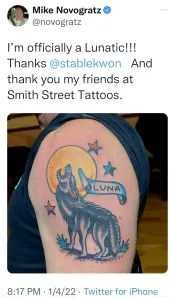In addition to promoting the token through the usual means, Novogratz got a large tattoo on his shoulder representing the token. Sadly for him, although the LUNA token would later fade away after crashing in spectacular (and fraudulent) fashion, tattoos are forever.
Galaxy Digital agrees to $200 million settlement over alleged LUNA manipulation
- "Galaxy Digital Settles with NYAG for $200 Million Over Luna Ties", Wall Street Journal [archive]
HyperLiquid loses $13.5 million in alleged JELLYJELLY manipulation incident
HyperLiquid validators voted to delist the JELLY token. They also evidently overrode the JELLY price provided by the market oracle in an attempt to reduce their losses, leading an unrelated crypto executive to question "Is that even legal?"
Polymarket suffers governance attack as whale manipulates Ukraine bet resolution; refuses refunds
Recently, $7 million was spent in a Polymarket market over whether Ukraine would agree to Trump's proposed mineral deal. Though no mutual agreement was reached, the market resolved to "yes". When it was challenged, a large holder of the UMA token cast a substantial number of yes votes to sway the outcome of the resolution, leaving the outcome in place.
Although Polymarket acknowledged that "This market resolved against the expectations of our users and our clarification" (referring to a Polymarket clarification that the resolution was too early as no mutual agreement was reached), they also refused to issue any refunds, writing that "this wasn't a market failure". "This is an unprecedented situation, and we have been in war rooms all day internally and with the UMA team to make sure this won't happen again. This is not a part of the future we want to build," the team member added.
Abracadabra loses $13 million in "Magic Internet Money"
This is the second time Abracadabra has been exploited, after suffering a $6.5 million theft in January 2024.
Binance acknowledges employee insider trading
Binance announced that they had fired the employee, as "This behavior constitutes front-running based on non-public information obtained from his previous role and is a clear breach of company policy." The company became aware of the insider trading after they were alerted by outside parties who submitted tips to the company.
Zoth hacked for nearly $8.3 million, second theft in two weeks
This is the second Zoth exploit in two weeks, following a $285,000 theft on March 6 by an attacker who took advantage of a bug in one of the platform's smart contracts.
Four.Meme suffers second hack in as many months
Four.Meme acknowledged the latest theft on Twitter, writing that they intended to reimburse users who lost money.
Zoth RWA restaking platform hacked
- "Zoth Hack Analysis", SolidityScan
1inch loses $5 million to smart contract bug
Wemix Foundation bridge hacked for $6.2 million
Founder of the Mask Network loses more than $4 million to a wallet hack
Almost $50 million stolen from Infini "stablecoin neobank"
Infini experienced a different form of "financial freedom" when attackers liberated almost $50 million from the company after a thief with access to a wallet with admin rights drained tokens, then swapped them for the DAI stablecoin, which unlike USDC cannot be frozen by its issuer.
The attack came only a day after a celebratory tweet from the company in which it had announced that they had achieved $50 million in total value locked, suggesting that the theft affected substantially all of the assets on the platform. Despite this, they have claimed that transactions on the platform are unaffected, and when someone asked how that was possible, they simply replied: "We've got solid runway to operate. No worries."
Infini attempted to contact the thief via on-chain message, threatening that they had "gathered critical IP and device information" about them, and asking them to return 80% of the funds in exchange for a promise that Infini "will cease further tracking or analysis, and you will not face accountability". However, Infini's 48-hour deadline has come and gone without any reply.
- "0xInfini Incident Analysis", CertiK
- Tweet by Infini [archive]
- Messages from Infini to the exploiter
$1.5 billion taken from Bybit crypto exchange
Bybit CEO Ben Zhou confirmed the attack on Twitter, writing that an attacker used an advanced phishing technique to take control of the hot wallet. Zhou also promised "Bybit is Solvent even if this hack loss is not recovered, all of clients assets are 1 to 1 backed, we can cover the loss."
Around 9,000 wallets used with Cardex fantasy trading card game compromised
Attackers compromised a private key belonging to the game's creators, which allowed them to drain wallets that still had an active session with the game.
Argentinian president Javier Milei promotes memecoin that then crashes 95% in apparent $100 million+ rug pull
However, within hours of the launch, insiders began selling off their holdings of the token. The token had been highly concentrated among insiders, with around 82% of the token held in a small cluster of apparently insider addresses. Those insiders cashed out around $107 million, crashing the token price by around 95%.
After the crash, Milei deleted his tweet promoting the project. He later claimed he was "not aware of the details of the project and after having become aware of it I decided not to continue spreading the word (that is why I deleted the tweet)."
zkLend hacked for around $9.5 million
Trader accidentally sends 2,000 SOL to bankrupt FTX
All in all, this customer is actually pretty lucky as far as erroneous transfers go. FTX's bankruptcy team still has access to FTX wallets, and are still actively working on recovering and disbursing assets to creditors. In some cases in the crypto world, erroneous transfers are lost forever.















